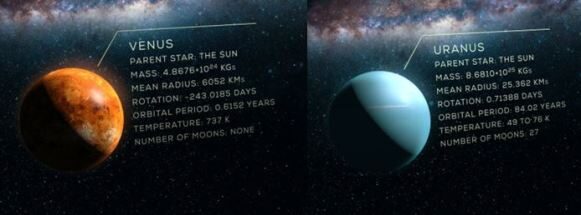How Many Planets are Mentioned in the Bible?
The Bible mentions the planets in a few instances, albeit indirectly. In the book of Jude, the phrase “wandering stars” is used, referring to the planets. While the specific planet names are not mentioned, if we consider the deities they are named after, every planet is referenced in the Bible. For example, the god Neptune (Poseidon in Greek) is indirectly mentioned in the book of Ezekiel. The god Hades (Pluto in Roman) is mentioned in the book of Psalms and Revelation. Even the planet Uranus is referenced in the Bible, referred to as “heaven.” However, it is important to note that the Bible does not talk extensively about the other planets, but it mentions objects in the heavens numerous times.
Key Takeaways:
- The Bible uses the term “wandering stars” to indirectly refer to the planets.
- Each planet is indirectly mentioned in the Bible through the deities they are named after.
- Neptune (Poseidon) is indirectly referenced in the book of Ezekiel.
- Hades (Pluto) is mentioned in the books of Psalms and Revelation.
- The planet Uranus is referred to as “heaven” in the Bible.
- The Bible does not provide extensive descriptions of the planets, but it mentions objects in the heavens.
The Concept of “Wandering Stars”
In the book of Jude, the Bible refers to the planets as “wandering stars.” This intriguing phrase holds biblical significance and provides insight into the ancient understanding of celestial bodies. While the specific names of the planets are not mentioned, the term “wandering stars” captures the idea of these celestial objects moving across the night sky, distinct from the fixed stars.
The concept of “wandering stars” can be found in various ancient civilizations, including Mesopotamia and Greece, where these celestial bodies were associated with different gods and deities. In the Bible, the mention of “wandering stars” alludes to the planets’ nature of wandering or appearing to wander due to their motion relative to the Earth.
“And the angels who did not stay within their own position of authority, but left their proper dwelling, he has kept in eternal chains under gloomy darkness until the judgment of the great day—just as Sodom and Gomorrah and the surrounding cities, which likewise indulged in sexual immorality and pursued unnatural desire, serve as an example by undergoing a punishment of eternal fire.” – Jude 1:6-7
As we explore further, we discover that the Bible indirectly references specific planets by mentioning the deities they are named after. For example, the god Neptune, known as Poseidon in Greek mythology, is indirectly alluded to in the book of Ezekiel. Similarly, the god Hades, corresponding to Pluto in Roman mythology, is mentioned in the book of Psalms and Revelation.
The Bible also makes an intriguing reference to the planet Uranus, referring to it as “heaven.” This association highlights the celestial realm and its connection to the divine in biblical scriptures. However, it’s important to note that while the Bible mentions these planetary references, it does not extensively describe or focus on the planets themselves. Instead, it frequently mentions objects in the heavens, acknowledging their presence without delving into detailed descriptions.
| Planet | Deity | Biblical References |
|---|---|---|
| Neptune | Poseidon | Book of Ezekiel |
| Hades | Pluto | Books of Psalms and Revelation |
| Uranus | Not applicable; referred to as “heaven” | Throughout various biblical books |
While the Bible’s primary focus lies elsewhere, these gentle references to planets and objects in the heavens serve to enrich the broader context of biblical teachings and remind us of the wonder and vastness of the cosmos.
Indirect References to Specific Planets
While the Bible does not mention specific planet names, it indirectly references them through the deities they are associated with. In biblical scriptures, the term “wandering stars” is frequently used, referring to the planets. These wandering stars are believed to be celestial bodies that move independently of the fixed stars, symbolizing the planets in the solar system.
One example of indirect planetary reference can be found in the book of Ezekiel. Here, the god Neptune, known as Poseidon in Greek mythology, is indirectly mentioned. The description of a cherub in Ezekiel 1:4-28 includes details of “a wheel within a wheel,” which is believed to allude to Neptune’s association with water and the sea.
Another planet referenced indirectly is Pluto, known as Hades in Roman mythology. In the book of Psalms and Revelation, there are mentions of the underworld and the ruler of the dead. These references are believed to indirectly allude to Pluto, the god of the underworld, and its association with the planet.
Interestingly, even the planet Uranus is indirectly mentioned in the Bible. In various biblical texts, the term “heaven” is used to refer to the celestial realm. This mention of Uranus as “heaven” symbolizes its association with the highest realm and divine power.
Indirect References to Specific Planets
| Planet | Deity | Biblical References |
|---|---|---|
| Neptune | Poseidon (in Greek mythology) | Book of Ezekiel |
| Pluto | Hades (in Roman mythology) | Book of Psalms, Book of Revelation |
| Uranus | Heaven | Various biblical texts |
While the Bible does not delve extensively into the planets, it mentions objects in the heavens numerous times. These references emphasize the vastness and wonder of the celestial realm, aligning with the broader themes of divine power and the eternal nature of God’s creation. Overall, the indirect references to specific planets in the Bible contribute to the rich tapestry of celestial symbolism and serve as reminders of the awe-inspiring nature of the heavens.
The Mention of Uranus as “Heaven”
Interestingly, the Bible refers to the planet Uranus as “heaven.” This unique mention can be found in various biblical texts, shedding light on the significance attributed to Uranus in the celestial realm. However, it is important to note that the Bible does not provide extensive descriptions or details about the other planets.
The reference to Uranus as “heaven” can be seen in passages such as Genesis 1:1, which states, “In the beginning, God created the heavens and the earth.” Here, “heavens” is understood to include the celestial objects, including Uranus. The Bible often uses metaphorical language and symbolism, and the association of Uranus with “heaven” highlights its spiritual and divine qualities.
While the Bible does not directly mention the names of specific planets, it indirectly references them through the deities they are named after. For instance, the god Neptune, known as Poseidon in Greek mythology, is alluded to in the book of Ezekiel. Similarly, the god Hades, also referred to as Pluto in Roman mythology, is mentioned in the book of Psalms and Revelation.
Although the Bible may not extensively discuss the planets, it frequently mentions objects in the heavens. This demonstrates the importance of celestial bodies in biblical teachings. Whether it is stars, sun, moon, or planets, these heavenly objects serve as symbols and reminders of God’s power and presence.
In conclusion, the Bible’s mention of Uranus as “heaven” provides a unique insight into the celestial realm. While it indirectly alludes to specific planets through the deities they are associated with, it primarily focuses on the broader theme of heavenly objects. The Bible’s spiritual significance and metaphorical language emphasize the divine nature of these celestial bodies, including Uranus.
The Bible’s Focus on Heavenly Objects
While the Bible does not extensively discuss the other planets, it does mention objects in the heavens on numerous occasions. From the book of Genesis to the book of Revelation, celestial references abound, highlighting the significance of the heavens in religious scriptures.
In various passages, the Bible describes stars, clouds, rainbows, and the sun and moon, emphasizing their role in God’s creation and divine plan. For example, in Genesis 1:14-16, it states, “And God said, ‘Let there be lights in the expanse of the heavens to separate the day from the night…and let them be for signs and for seasons, and for days and years.'” This verse acknowledges the presence and importance of celestial objects.
Moreover, the Bible incorporates rich imagery and metaphors related to the heavens, further highlighting their significance. In Psalm 19:1, it proclaims, “The heavens declare the glory of God; the skies proclaim the work of his hands.” This metaphorical language underscores the divine authority and beauty associated with heavenly objects.
| Objects in the Heavens | Biblical References |
|---|---|
| Stars | Genesis 1:14-16, Psalm 147:4, Isaiah 40:26 |
| Sun and Moon | Genesis 1:14-19, Psalm 19:4-6, Joshua 10:12-14 |
| Rainbows | Genesis 9:12-17, Ezekiel 1:28, Revelation 4:3 |
These references to objects in the heavens provide believers with a deeper understanding of God’s majesty and creative power. While the Bible may not provide extensive descriptions of the planets themselves, it showcases the magnificence of the celestial realm and its role in divine narratives.
The Absence of Extensive Planetary Descriptions
While the Bible mentions the planets, it does not provide extensive descriptions of them. Instead, it focuses more on the broader themes and teachings. However, there are references to these celestial bodies scattered throughout biblical scriptures. One such reference can be found in the book of Jude, where the phrase “wandering stars” is used to describe the planets. Although specific names are not mentioned, if we consider the deities after whom the planets are named, it can be inferred that every planet is indirectly referenced in the Bible.
In the book of Ezekiel, the god Neptune, known as Poseidon in Greek mythology, is indirectly mentioned. This reference gives us an insight into the ancient understanding of the planets. Similarly, the god Hades, equivalent to Pluto in Roman mythology, is mentioned in the books of Psalms and Revelation. This further confirms that the planetary associations are present in the biblical texts, albeit not in a direct manner.
One intriguing mention is the planet Uranus, which is referred to as “heaven” in the Bible. This unique connection between Uranus and the celestial realm highlights the symbolic language used in biblical scriptures. It demonstrates the significance attributed to heavenly bodies in religious and spiritual contexts.
It is important to note, however, that the Bible does not go into great detail when it comes to describing the planets. Instead, it frequently refers to objects in the heavens without specifying individual bodies. This highlights the Bible’s emphasis on spiritual teachings and moral guidance, rather than providing scientific or astronomical explanations. The absence of extensive planetary descriptions aligns with the narrative style and purpose of the biblical texts.
| Planets | Biblical References |
|---|---|
| Neptune (Poseidon) | Book of Ezekiel |
| Hades (Pluto) | Books of Psalms and Revelation |
| Uranus | Referred to as “heaven” in the Bible |
Conclusion
In conclusion, while the Bible indirectly mentions the planets through various references, it primarily focuses on other themes and teachings rather than offering detailed descriptions of these celestial bodies. The phrase “wandering stars” is used in the book of Jude, which is understood to refer to the planets. However, the specific names of the planets are not mentioned in most instances. Instead, the Bible indirectly references the planets through the deities they are named after.
For example, the god Neptune, known as Poseidon in Greek mythology, is indirectly mentioned in the book of Ezekiel. The god Hades, also known as Pluto in Roman mythology, is referenced in the book of Psalms and Revelation. Even the planet Uranus is mentioned in the Bible, though it is referred to as “heaven.”
It is important to note, however, that the Bible does not provide extensive descriptions or discussions about the other planets. While it mentions objects in the heavens, the focus is primarily on other spiritual and theological teachings. The celestial references serve as symbolic representations within the broader context of biblical scripture.
Overall, the Bible’s mention of the planets provides glimpses into the ancient understanding of celestial bodies, but it is not meant to be a scientific or comprehensive account. The primary aim of the Bible is to convey spiritual and moral teachings, offering guidance and wisdom to its readers. The celestial references, including the subtle mentions of the planets, add depth and richness to the biblical narrative, while inviting deeper contemplation and interpretation.
FAQ
How many planets are mentioned in the Bible?
The Bible mentions the planets in a few instances, but does not provide a comprehensive list. However, if we consider the deities they are named after, every planet is indirectly referenced in the Bible.
What is the concept of “wandering stars” in the Bible?
The phrase “wandering stars” is used in the book of Jude in reference to the planets. Although specific planet names are not mentioned, this phrase highlights their existence in biblical scriptures.
Are there indirect references to specific planets in the Bible?
Yes, specific planets are indirectly referenced in the Bible through the deities they are named after. For example, the god Neptune (Poseidon in Greek) is indirectly mentioned in the book of Ezekiel, while the god Hades (Pluto in Roman) is mentioned in the book of Psalms and Revelation.
Does the Bible mention Uranus?
The planet Uranus is referenced in the Bible as “heaven.” Although not specifically named as Uranus, this mention connects to the celestial realm.
Does the Bible focus on other objects in the heavens besides the planets?
Yes, the Bible mentions objects in the heavens numerous times without specifically focusing on the planets. These references highlight the vastness and divine nature of the celestial realm.
Why is there a lack of extensive planetary descriptions in the Bible?
The Bible does not provide in-depth descriptions of the planets as it primarily focuses on other themes and teachings. The emphasis is on spiritual guidance and understanding rather than scientific details.





